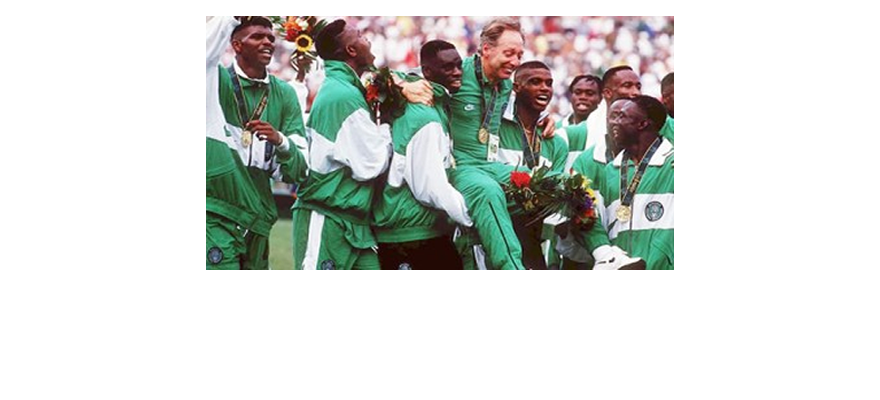Green and Gold: A New Era of Success for the Super Eagles? by Solace Chukwu
Football is easily the world’s most popular and televised sport. It is estimated that about 46 per cent of the world’s population tuned in to watch the 2010 FIFA World Cup staged in South Africa, a truly staggering figure. It is an escape, a release, and an obsession all in one; a conduit for the channeling of the collective expectations and hopes of many. We watch and invest our own selves in doing so. Faced with myriad challenges daily and in a constant struggle to survive, we hope somewhere deep within us that there will, at some point, be some eclectic alignment of various factors, resulting in some happy accident that brings with it the eradication of all problems. However, at the attainment of a certain mental shore, our hopes are abraded and cynicism sets in, stealing over all gradually till we accept that there is indeed no such constellation of cosmic happenstance. What little hope we have stowed away in the basement of our souls, we invest in such things as football. So has our puerile expectation of perfectly ordered circumstances seeped into even our perception of the beautiful game?
The term “golden generation” has become part of the lexicon of football terminology, describing a group of outrageously talented individuals who have, through careful planning and nurturing (and a dash of serendipity) come together and who will doubtless grow to be world-beaters. Throughout history, most nations with a strong football culture have anointed such a group at one or numerous times. Like our primordial hope, however, life has found a way to corrupt even this. The term has also come to symbolise inexplicable underachievement. Perhaps the most popular golden generation was that of Portugal. Luis Figo, Emilio Peixe, Joao Pinto, Manuel Rui Costa, Fernando Couto, and Jorge Costa dominated youth football, winning successive U-20 World Cups (or World Youth Championships, as they were called then); it was generally assumed that they would take the world by storm. They were too talented, too cohesive a unit not to. However, it took them eleven years to qualify for a FIFA World Cup, and the closest they got to any form of silverware was a controversial semi-final defeat to eventual winners France at the European Championships in 2000. Four years later, they got to the final of the tournament on home soil, losing to underdogs Greece, but the crux of that golden generation was already over the hill. Nigeria has had its own golden generation: the group that was crowned African champions, dazzled the world at the World Cup in 1994, and earned the moniker “The Super Eagles” was brimming with talent groomed for over half a decade by charismatic Dutchman Clemens Westerhof. A year before that, a marker had been laid down by the national U-17 side, who romped to victory at the 1993 World U-17 Championships, introducing to the world the talents of Nwankwo Kanu, Wilson Oruma and Celestine Babayaro, to name a few. A cross-section of both teams went on to achieve Nigeria’s greatest football success: a gold medal at the 1996 Olympic Games in Atlanta. The Super Eagles go into this year’s World Cup in Brazil as reigning African champions, a title they have held since their unexpected victory in 2013. Ending a nineteen-year wait is enough reason to celebrate, but perhaps if we pay attention to the history lesson in the previous paragraph, we can gleam a reason for further optimism. Nigeria also presently holds the U-17 world title as well, in one of the most dominant campaigns in the competition’s history; the Golden Eaglets eclipsed the previous record for number of goals scored in that age-grade competition, firing in 26 in only seven games; and espoused the mid-70s Dutch football philosophy of Total Football based on constantly interchanging positions and quick passing. If history is anything to go by (and it usually is), the time may be just right for another golden generation, an age of Nigerian football dominance. Doubtful? Well, the Golden Eaglets of 1993 won their title in Japan (Asia), the World Cup in 1994 was hosted by the USA, and the 1996 Olympics was hosted by Atlanta (Georgia, USA); the Golden Eaglets of 2013 won their title in the United Arab Emirates (Asia), the 2014 World Cup will be hosted by Brazil, while the 2016 Olympic Games is to be staged in Rio (Brazil). Make of that what you will. Could the stars actually align? Certainly, it all seems to be coming together. Scoffing? Do not begrudge me the embers of hope. I am Nigerian, after all. Image source





